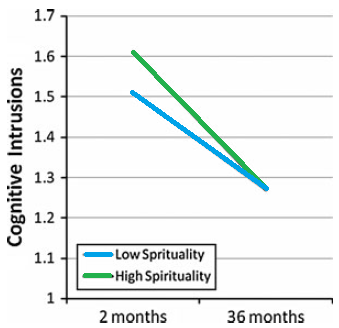In the two months following the 9/11 attacks in 2001, Daniel McIntosh, a psychologist at the University of Denver, and colleagues ran an internet survey of 890 people to gauge their happiness, cognitive intrusions (flashbacks and other post-traumatic stress), and diagnoses of anxiety and depression.
They found that high levels of religious attendance were linked to more happiness (positive affect, in the jargon), fewer cognitive intrusions, and fewer cases of anxiety and depression.
People with strong religious beliefs (i.e. those who said that “My whole approach to life is shaped by my spiritual or religious beliefs” and “I try hard to live all my life according to my religious or spiritual beliefs”) were also happier, but there was no correlation with anxiety and depression.
However, strong believers (“High spirituality” in the graph) actually had more cognitive intrusions after 9-11. These gradually declined over time until they dropped back to the levels of non-believers by the end of the study.
Now, the religious attendance thing you would expect. Religious people in the USA regularly report they were happier, and it’s easy to believe that belonging to a group could help you cope with the trauma. There was another recent study, this one looking at Italian earthquake survivors, which also found that people who attended religious services were protected from trauma.
But the high distress of religious believers is interesting. That differs from the Italian study, which found that religious believers were no more or less traumatised than non-believers. But it suggests that people with more religious belief felt more connected with the event in some way.
One thing they didn’t look at was how religious beliefs changed after the event. There has been at least one study looking at this (which found that the most directly traumatised tend to lose religion), but other studies looking at trauma and belief have shown a mixed picture!
![]()
McIntosh DN, Poulin MJ, Silver RC, & Holman EA (2011). The distinct roles of spirituality and religiosity in physical and mental health after collective trauma: a national longitudinal study of responses to the 9/11 attacks. Journal of behavioral medicine, 34 (6), 497-507 PMID: 21344318
 This article by Tom Rees was first published on Epiphenom. It is licensed under Creative Commons.
This article by Tom Rees was first published on Epiphenom. It is licensed under Creative Commons.














